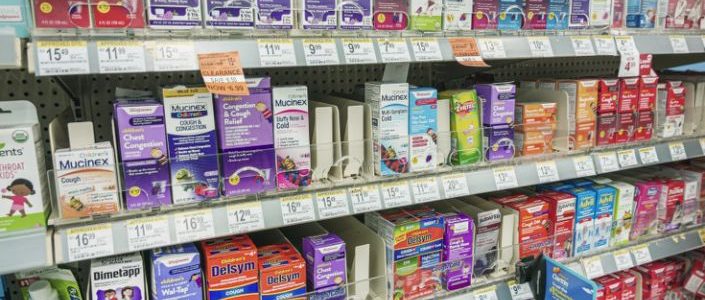
Coughing is one of the hallmark symptoms of being infected with the novel coronavirus. So it’s no surprise that many are swigging dextromethorphan, a workhorse cough suppressant, to calm those bone-rattling expulsions of germs and air.
It may be doing them more harm than good, new research suggests.

As part of an ambitious project to identify drugs that could be repurposed to treat COVID-19, an international team of scientists reported Thursday they had happened upon a surprising finding: A common active ingredient in dozens of over-the-counter cough syrups, capsules and lozenges appeared to boost replication of the SARS-CoV-2 virus when tested under laboratory conditions.
That’s a long way from concluding that cough medicines containing dextromethorphan will worsen the condition of people infected with the new coronavirus, or that it will make frightening outcomes more likely. But the researchers said the findings are concerning enough for them to advise cough sufferers who might be infected with coronavirus to avoid these medications.

Given that cough suppressants are likely to be widely used by people with coronavirus infections — whether they’ve got an official diagnosis or not — the researchers called for more research on dextromethorphan’s safety.
Dextromethorphan stifles signals in the brain that set off the reflex to cough. It is a key ingredient of virtually all over-the-counter cough and cold formulations, including those sold as Robitussin, Benylyn, DayQuil/NyQuil, Delsym, Triaminic, and Theraflu.
In tests conducted at the Pasteur Institute in Paris, researchers found that when dextromethorphan was introduced into the cells of African green monkeys growing in petri dishes, the subsequent addition of SARS-CoV-2 resulted in more prolific viral growth.
UC San Francisco pharmacologist Nevan J. Krogan, one of the team’s leaders, said that the group had alerted officials overseeing the government’s COVID-19 response to its concerns.
The findings were reported Thursday in the journal Nature.
But the group’s discoveries raise hopes as well.
The research team, led by scientists at the Pasteur Institute and UC San Francisco, had set out to find promising potential treatments for COVID-19 among compounds that were already known to scientists, physicians and consumers. The idea was to identify drug candidates that could be deployed quickly, either separately or in combinations, to short-circuit the coronavirus’s ability to infect and sicken humans.
Their search turned up an array of drugs that have long been in use, including the antihistamine clemastine (present in Tavist and Allerhist), the antipsychotic haloperidol (marketed as Haldol), the cough medication cloparastine (which is used widely in Japan, Hong Kong and Europe), and the hormone progesterone, abundantly present in females and used in hormone replacement regimens and in reproductive and sexual-health drugs.
Other promising compounds turned up in their search are still being tested for a variety of cancers, including the experimental drug zotatifin from San Diego-based Effector Therapeutics Inc.; plitidepsin, a substance derived from a Mediterranean marine worm that’s being tested in Spain as a treatment for multiple myeloma; and ternatin, a mushroom-derived compound in early testing for its anti-cancer properties.
In the past, drug-hunters faced with a new viral threat have found new treatments by examining the distinctive features on the virus’ surface. Then, they’d look for known chemical compounds that would latch on to those particular features and kill or weaken the virus.
The 22-person team that launched the latest search in mid-March took a starkly different approach.
Starting with the blueprints contained in the 30 genes of the new coronavirus, they built its world from the inside out. They synthesized all the proteins the virus makes and recorded how each one interacts with proteins inside a human host. Then they identified 332 distinct steps necessary to ensure the coronavirus can enter a cell, hijack its machinery, and make copies of itself.
The result was a commando’s road map. Next, they had to find any compound known to intervene somewhere in that long chain of events.
Their search turned up 69 existing drugs, experimental drugs, or compounds still on the way to becoming drugs. Collectively, they offered the possibility of disrupting the virus’ life cycle in 62 different ways.
Some of the compounds the team identified are “many times more potent” than remdesivir, a failed Ebola drug that is finding new life as a COVID-19 treatment, said Krogan, senior author of the Nature study.
Krogan and his colleagues noted that many of the compounds would probably work best in tandem with remdesivir rather than competing against it.
“A treatment that will be successful will be combinatorial,” said Krogan, a UCSF cellular molecular pharmacologist.
If scientists use his team’s insights about where and how the coronavirus might be disrupted, he added, it should help them create a potent cocktail of drugs that will attack and disrupt the virus at many points in its life cycle, he added.
Credit: Yahoo News
